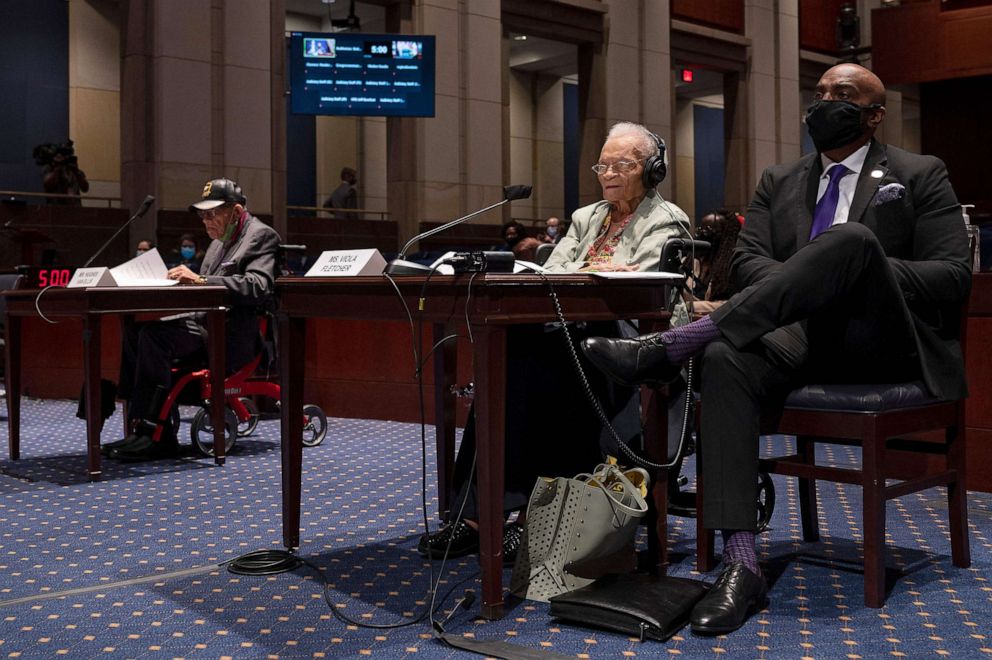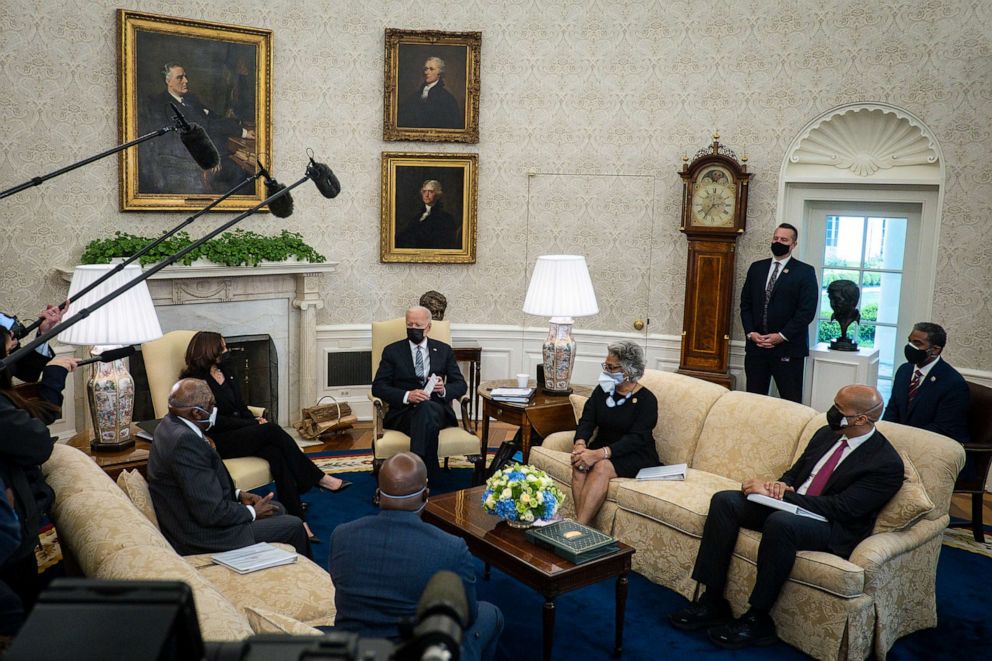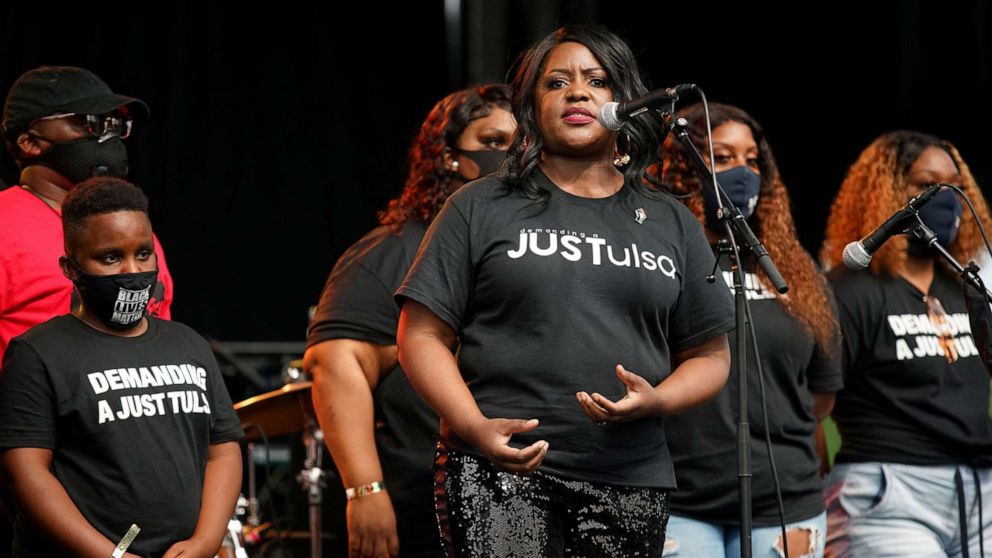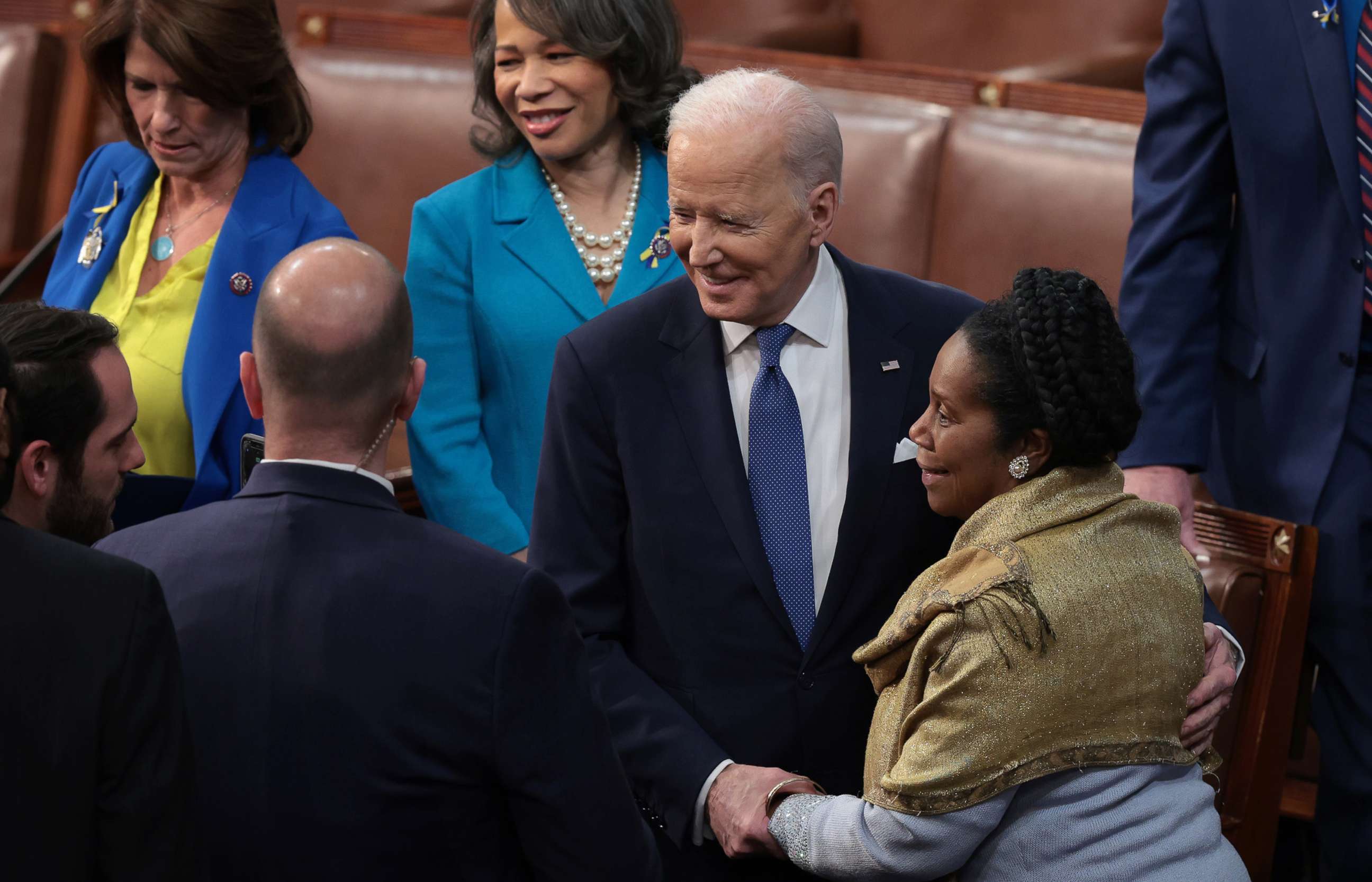Advocates, lawmaker call for Biden to sign an executive order to study reparations
Advocates call for help from the White House as H.R. 40 stalls in Congress.
Earlier this month, over a dozen civil rights and religious groups sent a letter to the White House calling on President Joe Biden to act on reparations by signing an executive order to study reparations by Juneteenth. This comes after a decadeslong push to establish a 13-person reparation commission in Congress.
Shortly after the end of the Civil War, formerly enslaved families were promised by Union leadership 40 acres and a mule. The promise was never fulfilled, however a reminder of the centuries-old promise remained in Congress for decades. H.R. 40, the Commission to Study and Develop Reparation Proposals for African Americans Act, has been introduced in every legislative session since 1989.
H.R. 40 seeks to establish a commission to study "and consider a national apology and proposal for reparations for the institution of slavery, its subsequent de jure and de facto racial and economic discrimination against African Americans, and the impact of these forces on living African Americans, to make recommendations to the Congress on appropriate remedies, and for other purposes," according to H.R. 40's text.

In recent years, the bill has gained traction politically. In 2019, Speaker Nancy Pelosi, hundreds of members of Congress and over 350 organizations such as the U.S. Conference of Mayors, NAACP and ACLU publicly announced support for reparations. H.R. 40 was able to pass out of the House Judiciary Committee in 2021, however, it has failed to come to a vote in the House or Senate.
When asked about the letter from racial justice advocates calling for Biden to meet with them and sign the H.R. 40 executive order, now former White House press secretary Jen Psaki said she was unaware of the letter. However, she said there was a range of executive orders the White House was considering including police reform and student debt.
Psaki previously reiterated in 2021 that President Biden supported the study of reparations. However, when asked if he would support a bill on reparations Psaki said, "We'll see what happens through the legislative process.”
Asked if Biden supports an executive order on the study of reparations, Psaki said at the time, "it would be up to him, he has executive order authority, he would certainly support a study, and we'll see where Congress moves on that issue."
A source familiar with White House proceedings told ABC News that Biden’s support of H.R. 40 has not changed, however he feels that “we don't need a study to continue to advance racial equity.”
White House senior advisor Cedric Richmond has held meetings and listening sessions with H.R. 40 advocates.

Dreisen Heath, a researcher and advocate in Human Rights Watch's United States Program focusing on racial justice issues, said that the push for an executive order for H.R. 40 is a necessity. She said if a “commission Bill cannot advance through both chambers, then that's why you have other branches of government, who have also promised to execute on a study for reparations and developing reparations proposals, to commit to executive action and do it.”
Heath added other bills have dealt with the legacy of enslavement with majority support from Republicans, including Anti-lynching legislation that stalled for over a century.
“If Juneteenth is a consensus, then reparations also has to be a consensus. And if the congressional chambers aren't going to commit to doing something that they all publicly said that they were going to do, then the President has to do what he also publicly promised that he was going to do," Heath said.
For many fighting for reparations, Tiffany Crutcher is seen as an example of the cumulative impacts that enslaved people have overcome.
Crutcher is the decedent of enslaved African Americans. Her great-grandmother, Rebecca Brown Crutcher, owned a BBQ pit in Greenwood and survived the deadliest racial attack in American history, the Tulsa Race Massacre of 1921. Her twin brother Terrance Crutcher was an unarmed black man was fatally shot by a police officer in Tulsa, Oklahoma in 2016. Her mother, Leanna Crutcher, died after a month-long battle with COVID-19 in 2021.

The Oklahoma native said she believes race is a factor in why reparations has happened in the centuries since it was first proposed. “I think that people believe and repair and reparations when it comes to everybody, but Black people.”
To her reparations is about more than just cash payments. “We're talking about decades and centuries of harm. That caused my mother to recently pass away of COVID-19 because of the continued harm. We're talking about decades of harm that caused my brother to take his last breath alone.”
She added, “laws that are in place that allow the brutality of Black people in this country is so much more than money."
H.R. 40’s lead sponsor Rep. Sheila Jackson Lee told ABC News, “We can't allow a question of slavery and its impact on the descendants of enslaved Africans today, African Americans to go unanswered. Because we believe the momentum is there, because President Biden is a President that understands equity and is committed to and who has recognized the importance of African Americans in this nation this is a diverse nation, but he recognizes the importance of not only African Americans, but our history.”
Jackson Lee told ABC News one of the things that she hopes will happen if H.R. 40 gets signed by Biden is the retelling of human stories.
“There are many human stories about the impact of slavery, because there are descendants who can clearly document their life and their history to the slaves who were enslaved over 200 years," Jackson Lee said.
The Congresswoman said she “feels very confident that the President understands the importance of HR 40,” and added that she hopes “that we will see movement on this issue.”

University of Connecticut professor Thomas Craemer has studied the topic of race and reparations for over 15 years. Craemer published study in 2015 estimating that the costs of slavery and loss of wealth through slavery cost a conservative estimate of $14.5 trillion through 2009, which didn’t account for inflation. His study also didn’t account for colonial slavery or the loss of wealth due to discrimination after slavery.
Craemer told ABC News when H.R. 40 was introduced, it was a progressive idea, however he says with the amount of research into the impacts of slavery, “setting up a commission to study is not enough. The goal should actually include actual reparations payouts, as a stark starting amount rather than only studying it because they could be a delay tactic. Investment.”
He said reparations “is not a past injustice but a injustice, and it has to do with loss inheritances, and taken inheritances, rights as given. We ignore it when it comes to African American inheritances, and this is a present day wrong that needs to be right.”
“The time is urgent more than ever before,” Crutcher told ABC News on the 108th birthday of Tulsa Race Massacre survivor Mother Viola Fletcher. She notes the last three remaining survivors of the Massacre have waited a lifetime for restorative justice.
Crutcher said for Mother Leslie Randall, 107, and Uncle Hughes Van Ellis, 101, “there's no greater time. How much longer will they have to wait for justice?”




